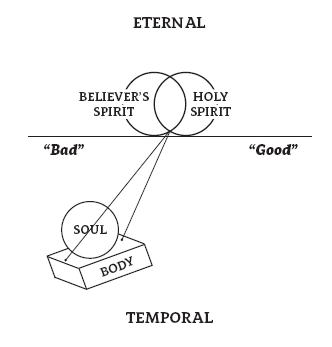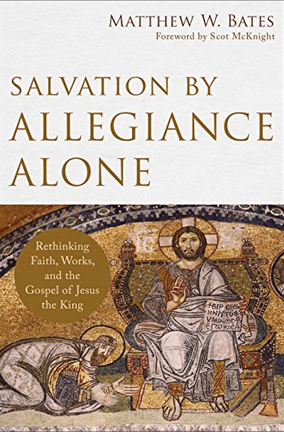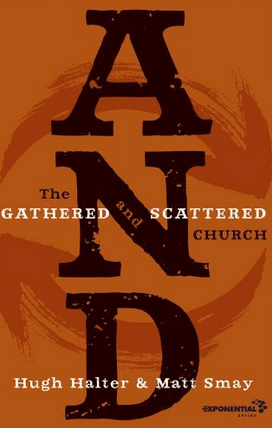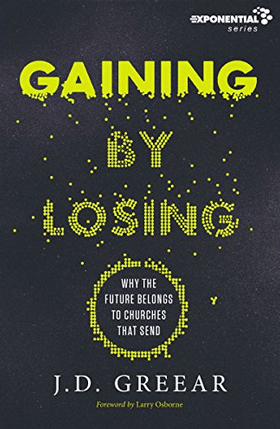 Surprise the World: The Five Habits of Highly Missional People
Surprise the World: The Five Habits of Highly Missional People
by Michael Frost
In his first chapter entitled “Living Questionable Lives,” Frost lays the groundwork for the rest of the book by writing that the church is made up of two groups with reference to evangelism and the Great Commission.
Contrary to the myth that every believer is an evangelist, the apostle Paul assumes a twofold approach to the ministry of evangelism. First, he affirms the gifting of the evangelist — interestingly, not the gift of evangelism but the evangelist herself is the gift (see Ephesians 4: 11). Second, he writes as though all believers are to be evangelistic in their general orientation. (Frost, Michael (2015-11-23). Surprise the World: The Five Habits of Highly Missional People (p. 2). NavPress. Kindle Edition.)
The book is not concerned with helping the evangelist. Rather, it focuses on practices that can be adopted by the rank and file of the church that will make us all more effective ambassadors for Christ.
In other words, the biblical model is for leaders to (1) identify, equip, and mobilize gifted evangelists (who then take a leadership responsibility for the church’s evangelism) and (2) inspire all believers to live questionable lives. If all believers are leading the kinds of lives that evoke questions from their friends, then opportunities for sharing faith abound, and chances for the gifted evangelists to boldly proclaim are increased. In brief, our task is to surprise the world! (p.5)
This twofold approach literally transformed the Roman Empire. While evangelists and apologists such as Peter and Paul were proclaiming the gospel and defending its integrity in an era of polytheism and pagan superstition, hundreds of thousands of ordinary believers were infiltrating every part of society and living the kind of questionable lives that evoked curiosity about the Christian message. They surprised the empire with their unlikely lifestyle. (p.7)
They were literally the most surprising alternative society, and their conduct raised an insatiable curiosity among the average Roman. (p.10)
Our challenge is to find what similarly questionable lives look like in the twenty-first century… There’s an old communication theory that goes like this: When predictability is high, impact is low. In other words, when the audience thinks they know what you’re going to say, and you go ahead and say it, it makes very little impact. On the other hand, when an audience is surprised or intrigued, they will think long and hard about what they’ve heard. (pp.12-13)
To fulfill the evangelistic mandate that Paul and Peter and the gospel present us with, we need to be propelled outward, into the lives of our neighbors, but also upward, into deeper intimacy with Jesus. This isn’t merely an individual challenge; indeed, Paul seems to suggest that we fulfill our evangelistic mandate collectively, as we also move inward into a self-consciously Christian community, acknowledging the evangelists we’ve been gifted with and the responsibility to live questionable lives that we’ve been vested with. We need to become a godly, intriguing, socially adventurous, joyous presence in the lives of others. This won’t be a matter of simply doing somewhat surprising but occasional things. I believe we need to develop a new set of rhythms, or habits, that foster a missional lifestyle that intrigues others. (p.14)
A New Set of Habits
Frost has written a practical guide to change how we live. His purpose is to help us develop into a new way of thinking and living, which is highly biblical. Jesus told his followers that only those who put his teachings into practice are wise. We cannot think ourselves into being missional: we must act our way there. It is…
…the challenge of finding regular rhythms or habits that transform our everyday lifestyles. (p.17)
Just as a society’s desirable habits are shaped by and help shape that society’s values, so can an individual’s personal habits should flow out of his or her values and help develop them further. We learn by doing. In my own experience, after adopting missional practices because of conviction of its being the right thing to do, I gained greater depth of understanding and insight from putting those convictions into practice. God opened up my mind to truths I had not seen before.
The trick is to develop habits that unite us together as believers, while also propelling us into the lives of others. We also need habitual practices that don’t deplete our energy and burn us out, but rather reenergize us, replenishing our reserves and connecting us more deeply to Jesus. (p.22)
Frost devotes most of the remainder of the book to laying out five practices that can be adopted by the average follower of Christ that will produce a more missional mindset and lifestyle.
“the central issue is never strategy, structure, culture, or systems. The core of the matter is always about changing the behavior of people.” (p.25)
The habits Frost gives form an easily remembered acrostic – BELLS: Bless, Eat, Listen, Learn, and Sent.
Bless
Frost suggests that we adopt the practice of regularly blessing at least three people around us each week, at least one of whom is not in our church, through words of encouragement and affirmation, acts of service, and thoughtful gifts. Research indicates that people who do such things:
…had almost 50 times as many conversions than the “converters”! The “blessers” were 50 times more successful at helping people find their way back to God! (p.35)
I do not know if those figures are accurate, but blessing people certainly opens their hearts.
Frost warns us that blessing people in order to convert them misses the point. Rather we bless people because we are blessed by God and can pass that on to other. It is what we do. According to God’s promise to Abraham, we were put here to bless the nations. Love blesses with no thought of being paid back. Jesus did this regularly. Also, we must study people so that our blessings actually make them feel blessed. Giving is not about making us feel good. It must be done to add joy, strength,and value to others. We must also be prepared for our gifts and blessings to be misunderstood or rejected.
Eat
In this chapter the author shows us how to practice hospitality around the table in order to open doors into the hearts of people in order to eventually share the gospel. He asks us to eat with three people a week, at least one of whom is not in our church.
But I want you to know that this isn’t merely good missional strategy. It is a way to walk in the footsteps of Jesus. English pastor and author Tim Chester once posed the question, “How would you complete the following sentence: ‘The Son of Man came . . .’?” There are three ways that the New Testament completes that sentence; while the first two are well known (and might have come to your mind when you read Chester’s question), the third is surprising:
“The Son of Man came not to be served but to serve, and to give his life as a ransom for many” (Mark 10: 45, ESV).
“The Son of Man came to seek and to save the lost” (Luke 19: 10, ESV).
“The Son of Man came eating and drinking” (Luke 7: 34). (Frost, p.44)
The table ought to be the primary symbol of the Christian gathering. It represents hospitality, inclusivity, generosity, and grace. (p.46)
The invitation to share a table is a profoundly meaningful one in every culture. So I’m calling you to foster the habit of eating with three people each week. You won’t need to add a great deal into your often already busy schedule. You already eat three times a day. That’s twenty-one meals a week. I’m simply asking that you bring another person to your table for three of those. Or if you want to cut corners, you could bring three people to your table for one of them. Your meal could be an elaborate dinner party, or it could be breakfast, or even just coffee and a donut. Just sit across a table from three people this week, and . . . talk. (p.47)
Sharing meals together on a regular basis is one of the most sacred practices we can engage in as believers. Missional hospitality is a tremendous opportunity to extend the kingdom of God. We can literally eat our way into the kingdom of God!
If every Christian household regularly invited a stranger or a poor person into their home for a meal once a week, we would literally change the world by eating! (pp.47-48)
Opening our table to others is a tremendous act of friendship. Jesus ate at the table of those who were considered sinners by those who merely point the finger at others without loving them. In the case of Zaccheus, it resulted in his conversion. Frost points out that the missional principle is that communion often precedes conversion.
All I’m asking, initially, is that you invite three people to share your table, at least one of whom isn’t a churchgoer. But what you’ll find happening is that people will reciprocate your hospitality. You’ll start getting return invitations. And when that happens you’ve got serious missional traction. (p.56)
Listen
In this chapter, Frost asks us to develop the habit of spending at least one period per week listening quietly and intently to the voice of God’s Spirit.
Fear and laziness are mission killers. Fear of persecution, fear of standing out or causing offense, fear of having to answer someone’s tricky questions — fear will shut down missional engagement every time. Likewise with laziness: I don’t mean the kind of laziness that has you lying on the couch eating Doritos and watching sports on television. I mean the inner voice that prompts you not to bother with reaching out to another person, not to bother with offering yourself in the service of others. Laziness tells you that you don’t have the time; laziness whispers to you that you need to take care of yourself first. In fact, fear and laziness will motivate you to come up with dozens of reasons why you can’t or shouldn’t open yourself to others. It is the countermanding voice of the Spirit that will help us resist our worst impulses. (pp.58-59)
Our practice of generosity and hospitality must be intentionally nurtured and sustained by the disciplines of solitude, silence, and prayer. We need to learn to listen to the voice of God, particularly as he shapes us as missionaries and fills our hearts with love for those to whom he sends us. (pp.60-61)
Don’t try to connect to God the Holy Spirit on the run. Set aside a designated time each week. I’m only asking for one (although if you want to do it more than once a week, be my guest). See it as a precious time alone, just between you and God. Block it out in your calendar. Let people know that Monday night or Saturday morning, or whatever time you designate, is your time of solitude. (p.62)
The difficulty for many people seeking to live missional lives is negotiating the spectrum between being withdrawn and judgmental on the one hand and entering fully into a social setting that might be considered ungodly on the other… Trying to figure out how to sit somewhere in the middle — a godly, intriguing, socially adventurous, joyous presence in the lives of others — is tough. I don’t think we’re clever enough on our own to find that balance. That’s where the missional voice of the Spirit comes in. (pp.67-68)
Learn
In this chapter Frost asks us to devote at least one period per week to the study of Christ and his work in the Gospels in order to better acquaint ourselves with who he is and how we fished for people.
I think that if we’re being sent into the world to live intriguing lives, arouse curiosity, and answer people’s inquiries about the hope we have within, we need more than ever to know what Jesus would do or say in any circumstance. (p.72)
Lots of churches seem to get the idea that to be missional we must go out to others with the Good News, rather than merely wait for people to come to us.
But the term incarnational refers to another dimension of mission. It describes not simply going out but also the difficult work of going deep with others. Just as God took on flesh and dwelt among us in Jesus, so his followers are called to dwell among those to whom they’re sent. (p.75)
Sent
Frost asks us to keep a journal of how God uses us to reach others with the Gospel via the other practices.
Why do I want you to journal your experience? Well, as Anne Broyles says, in keeping a journal, “what our mind is thinking and our heart is feeling becomes tangible: ink on paper.”[ 33] Indeed, journaling is more than just a way of thinking things through: It is a recognized spiritual discipline. More than just recording your thoughts, however, I want you to identify ways you mirrored God’s work of justice, reconciliation, beauty, and wholeness in the world. This will be more than writing, “I shared Christ with someone today” or “I treated a confused student kindly today.” It will be about helping you to sort through the myriad everyday ways you operate as God’s ambassador in your world. I want you to explore how your commitments to craftsmanship, care, and commerce reflect the things of the kingdom. (pp.93-94)
This chapter contains a number of creative ways to journal which will make it more interesting and rewarding.
Keeping a journal and recording all the ways you are mirroring God’s work in the world is similar. It will start to shape the way you think about yourself. You will eventually come to self-identify as a missionary, a sent one. You’ll be looking at your life and how you conduct yourself differently, and the journaling process will reinforce this in creative and useful ways. (p.96)
Discipleship, Nurture, and Accountability
This chapter gives many practical tips on making missional living habitual and effective. The idea is that being missional becomes our lifestyle, not a one and done program.
But missional effectiveness grows exponentially the longer we embrace these habits and the deeper we go with them. (p.99)
Frost states that habits take quite a while to form so that they become a natural part of our lifestyle. He suggests that we need people around us who can help us remain true to our purposes – accountability partners who are walking the same road of discipleship. This is where “the rubber meets the road.” It is one thing to philosophically agree with being missional and quite another to make it part of our everyday life. The reward is in the doing.
This book is short and sweet and definitely worth the time needed to read it. My hope is that we will all put at least some of these practices into our lives. Even if we do not journal, we can begin or increase the other four. But just for fun, why not journal, too? You might like it.


 The authors effectively use an example of a swing to communicate the difference between soul and spirit. The idea is that we are firmly anchored in Christ to an unchanging and stable relationship with God in the spirit in the eternal realm. In the temporal realm, where the body and soul abide, our experience is variable and changing. This is not necessarily a bad thing. It is just how things are. When we understand that we must live by faith in the unchanging realities in the spirit, it brings peace and rest to our souls. We no longer measure “how we are doing” by how the soul and body are faring or feeling. Instead, we always go back to our rest in the eternal position we have in Christ.
The authors effectively use an example of a swing to communicate the difference between soul and spirit. The idea is that we are firmly anchored in Christ to an unchanging and stable relationship with God in the spirit in the eternal realm. In the temporal realm, where the body and soul abide, our experience is variable and changing. This is not necessarily a bad thing. It is just how things are. When we understand that we must live by faith in the unchanging realities in the spirit, it brings peace and rest to our souls. We no longer measure “how we are doing” by how the soul and body are faring or feeling. Instead, we always go back to our rest in the eternal position we have in Christ.





